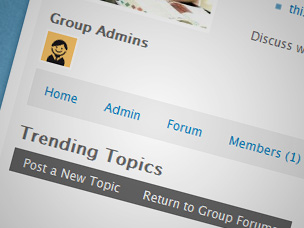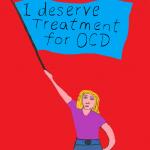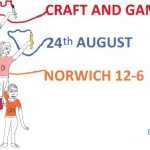Getting help for OCD (under 18)
August 1st 2015
About the author: Rachel is sixteen years old and has just finished GCSEs. She lives in London and has had OCD for about 2 years.
GETTING HELP FOR OCD
Treatment for OCD usually is either CBT (Cognitive Behavioural Therapy) with ERP (Exposure and Response Prevention), or medication. Getting into the system for getting professional help for OCD most likely begins with going to your GP, or being referred to CAMHS (Child and Adolescent Mental Health Services).
Going to your GP:
When you go to the GP, it can be useful to write down a list of obsessions and compulsions that you want to discuss, as well as what makes your obsessions and compulsions better or worse throughout a day or week etc. You can bring a family member or friend if you would prefer, or you can go alone to the GP. Also, if you have taken online tests which have said you should see a GP, maybe print this out and bring it with. If you don’t think the GP is understanding what you are describing, you could mention that you think you have OCD, and/or be assertive but polite and ask to be referred to CAMHS. The speed at which you are referred to CAMHS can depend on where you live, how severe your condition is etc.
16 is an important age relating to various rights including medical rights in the UK. For example, you must be sixteen to choose your own GP. Additionally, while you are entitled to a confidential appointment at any age as long as you specify you don’t want your parents/other people to be told, your doctor can refuse to accept your request for confidentiality, and therefore not discuss something(s) with you if you are under 16.
Other ways of accessing CAMHS:
If you can’t go to a GP, you can try speak to a teacher you trust and feel comfortable talking to, or, if your school has one, speak to a school guidance counselor. Your teacher, guidance counselor (or anyone) cannot promise not to tell anyone about what you have said, as they may have to tell other staff or professionals to get you the help you need. (At any point, anyone, including therapists, phycologists etc. may have to break confidentiality if you or someone else is at risk of harm).
Self-help:
Another way you could try to get help without going to a GP would be to use books or websites to do CBT by yourself, although this probably won’t be as useful or effective as going to CAMHS to receive therapy, medicine or both. (The NHS runs a “books by prescription” service, in which books related to medical conditions can be prescribed to be borrowed from a participating library).
To sum up:
Going to your GP to get referred to CAHMS is probably the most effective and easiest way to access treatment for OCD on the NHS
Other ways to be referred to CAMHS include being referred by teachers, social workers and school counselors
If you can’t go to a GP, or CAMHS, you can try using websites and books to use CBT to help yourself.
More information about CAMHS:
- http://www.youngminds.org.uk/for_parents/services_children_young_people/camhs/what_are_camhs
- http://www.youngminds.org.uk/for_parents/services_children_young_people/camhs/child_going_to_camhs
More information about going to a doctor’s appointment:
More information about healthcare for young people, including ages at which different things change:
More information about books on prescription:
More information about self-help (although this page is mainly focused on stress, anxiety and depression, some of the information and resources can be transferable)







